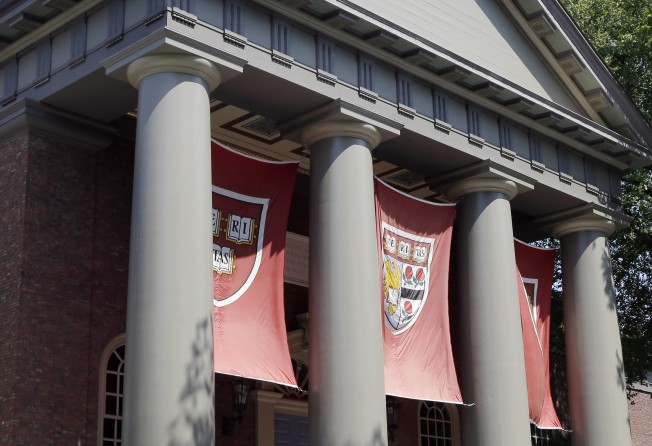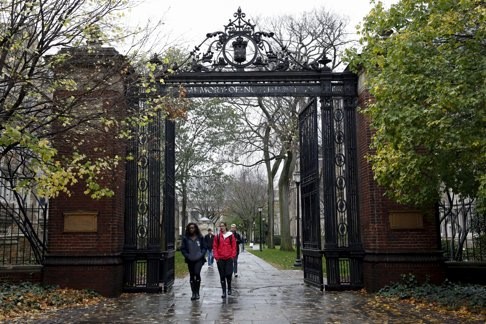Harvard’s sick of losing to Yale and has a plan to fix endowment
University’s management company has more than 300 employees including support staff, with a trading floor dabbling in stocks, bonds and other markets

In October, dozens of Wall Street financiers including activist shareholder Bill Ackman were invited to a lecture hall at Harvard to scrutinise the university’s lacklustre endowment returns – and a plan to revive them.
For more than an hour the Harvard Business School alumni debated whether the US$37.6 billion fund could generate at least 5 per cent a year as markets falter and whether it made sense to try to beat peers such as Yale University and Princeton University. At stake was Harvard’s status as the world’s richest university, with Yale, Stanford University and other schools making up ground through savvier investing and aggressive fundraising.
“It was kind of reassuring,” said Stephen Blyth, 48, who put together a turnaround plan after being named chief executive of Harvard Management in January. “There were people on both sides so I felt we must have it about right.”
Harvard’s endowment, the world’s largest and once the envy of asset managers, has sunk into mediocrity. Over the last five years, the fund has been trounced by chief rival Yale by almost 4 percentage points annually, equating to billions of dollars in lost revenue. Its 5.8 per cent one-year gain through June even lagged the Ivy League average, by 2 percentage points.
Blyth, a trader at Deutsche Bank before joining the fund in 2006, has vowed to produce better returns by revamping the investment decision-making process while leaning on Harvard’s rich alumni network for opportunities, particularly in alternative assets such as private equity and venture capital. The university was among the first to diversify into those riskier assets when they were much cheaper, pioneering a model of endowment management under former chief Jack Meyer.
“He’s got a tough job,” said Meyer, who left in 2005 after producing annual returns of around 15 per cent in his final decade. “He’s going to be good for Harvard, but I was very fortunate – it was the right time, the right place and the right people.”
Blyth was circumspect about the alumni advice yet has already begun overhauling the endowment. He’s setting more stringent targets, with a goal of landing in the top quartile of returns over five years against the university’s 10 wealthiest peers. The endowment previously compared itself against other schools as well as larger institutional investors, such as pension funds.
Backed by a revamped board of directors, he’s also cut a layer of top management and begun restructuring compensation and how the portfolio is allocated, with potentially even bigger bets on private equity and hedge funds.
“Stephen seems to have a very clear vision of the model he wants to pursue,” said Amy Falls, chief investment officer at Rockefeller University in New York, the third new outsider to join Harvard Management’s board this year.

The event in October followed a series of meetings Blyth has arranged with investment-manager alumni to get hot ideas. While endowments routinely rely on such networks, Blyth said he’s renewing relationships frayed as his predecessor Jane Mendillo repaired damage from the credit crisis.
“A lot of the heavy lifting that Jane did is behind us,” Blyth said. “We want to re-engage: we’re opening up, we’re back involved and people are responding positively to that.”
A Briton with a Harvard doctorate in statistics, Blyth’s wonkiness can mask an intense competitive spirit. He was paid $11.5 million in 2013, more than his boss Mendillo or anybody else in the industry. In his office he’s hung a framed T-shirt that reads, “Yale Sucks.”
“It says there’s a great rivalry between Harvard and Yale,” Blyth said, smiling.
The two endowments have diverged since the global financial panic in 2008. While almost all top schools posted investment losses of more than 20 per cent, Harvard was plunged into a deeper liquidity crisis, borrowing $2.5 billion as it paid penalties to unwind derivatives that backfired.
Mendillo, who succeeded former Pimco chief Mohamed El-Erian when hired in 2008, raised cash by selling more than $1 billion of prized private equity stakes at a discount. She dialled back risk, slashing commitments to less liquid buyout and venture capital funds that before the crisis had been the endowment’s top performing assets. Some critics say she missed out not investing at the lower prices.
“As a private equity fund investor, you want to have a consistent exposure to the market,” said Kevin Albert, head of global business development at London-based Pantheon Ventures, which oversees US$30 billion of assets. “Ideally you would be countercyclical.”
Mendillo, 57, who declined to comment, tried to distinguish the fund by making more direct investments in real estate and natural resources. While real estate has performed well, holdings in timberland in developing markets such as Romania have produced disappointments.
Blyth, who oversaw almost half the university’s portfolio before he was promoted, is committing more to private and public equity funds. He’s opening the door to bigger bets across the portfolio by replacing a strict asset allocation with ranges. Private equity and hedge funds could see the biggest increases, with new upper targets of more than 20 per cent each, according to scenarios laid out in his first annual report.
He faces several headwinds, including lower expectations for equities amid predictions of reduced global growth. Harvard’s size is another factor. While Yale manages US$25.6 billion, it employs fewer than 30 investment experts who farm out almost all the money to external managers. Harvard’s management company has more than 300 employees including support staff, with a trading floor dabbling in stocks, bonds and other markets.
With a new chief executive and private equity head hired last year, Harvard may also be at a disadvantage against funds such as Yale, where investment chief David Swensen’s relationships with top alternative asset managers go back decades.
“You can promise but it’s not very easy to deliver top quartile returns, to find all the opportunities, with a fund the scale of Harvard’s,” said Roger Ibbotson, a professor at Yale’s School of Management.
Harvard pays its managers more than counterparts at other schools, opening it up to criticism as it trailed rivals. The university is seeking to change that by tying all bonuses to overall returns, hoping it will encourage more collaboration across asset classes, Blyth said. Yet it could also accelerate the pace of departures, led this year by former alternative assets head Andrew Wiltshire, who retired in September and is not being replaced.
“It’s been a period of significant change,” said Blyth. “This is a new CEO, this is a new executive team, this is a new strategy, this is a new culture.”